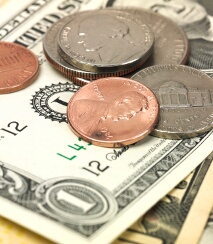
The US dollar is finishing the trading week higher against a handful of currencies as the market appears to be moving on from recent comments pertaining to the greenbackâs valuation. With a Federal Reserve bank president discussing the need for action ahead of a crisis and some data to throw in the mix, it has been a fun ride for the dollar this week.
For weeks, President Donald Trump has contended that the dollar is too high and that the central bank should follow others in trying to weaken their respective currencies. This would ostensibly boost exports, a major goal for the incumbent administration. Trump may have new fodder after the International Monetary Fund (IMF) essentially echoed the presidentâs sentiment.
In its External Sector Report, the IMF said that the US dollar is overvalued between 6% and 12%, making that conclusion using near-term economic fundamentals. It also noted that the Chinese yuan, the Japanese Yen, and the euro are valued correctly based on the fundamentals.
While the IMF might agree with President Trump on currency, it is sounding the alarm about trade. It warned that the US-China trade war could cost the global economy about $455 billion in 2020, adding that recent trade policy is impacting investment, business and consumer confidence, and trade flows. Rather than engaging in tit-for-tat tariffs, the IMF recommended that countries that have surpluses or deficits should attempt to liberalize trade policy and enhance the multilateral trade network.
An intensification of trade tensions or a disorderly Brexit outcome — with further repercussions for global growth and risk aversion — could affect other economies that are highly dependent on foreign demand and external financing.
The Fed is in some damage control mode on Friday after New York Fed Bank President John Williams said in a speech that it is important for central banks âto take preventative measures than to wait for disaster to unfold.â The market took these comments as a signal that the Fed was moving on a rate cut later this month, but he later clarified that the statement was based on academic research rather than an announcement on what the Federal Open Market Committee (FOMC) would be doing with interest rates at its next meeting.
On the data front, the University of Michiganâs Consumer Sentiment Index clocked in at 98.4 in July, up from 98.2 in June. The universityâs inflation expectations also came in at 2.6%. This comes one day after initial jobless claims totaled 216,000, matching the median estimate.
The US Dollar Index, a measurement of a basket of currencies, surged 0.36% to 97.15 and lifting its weekly gain to 0.35%.
The USD/CAD currency pair rose 0.41% to 1.3083, from an opening of 1.3028, at 16:02 GMT on Friday. The EUR/USD tumbled 0.51% to 1.1222, from an opening of 1.1278.
If you have any questions, comments, or opinions regarding the US Dollar, feel free to post them using the commentary form below.